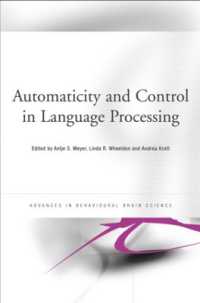- ホーム
- > 洋書
- > ドイツ書
- > Social Sciences, Jurisprudence & Economy
- > Environment, Agriculture, Forestry
- > Environment
Full Description
Indicators are more and more applied to describe and analyze complex systems. One possibility is the application of the mathematical theory of partial order, especially when the indicator system shall be used for ranking purposes.








